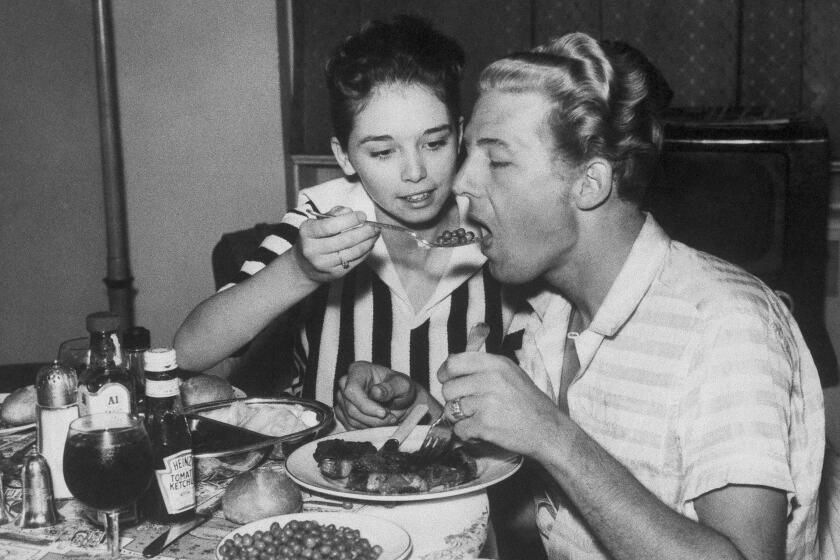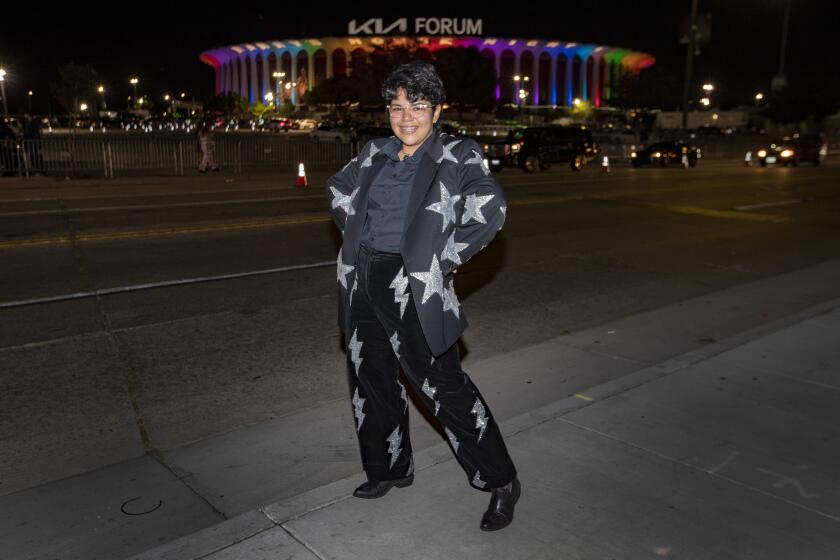From lovable weirdos to queer icons, the B-52’s dance this mess around one last time
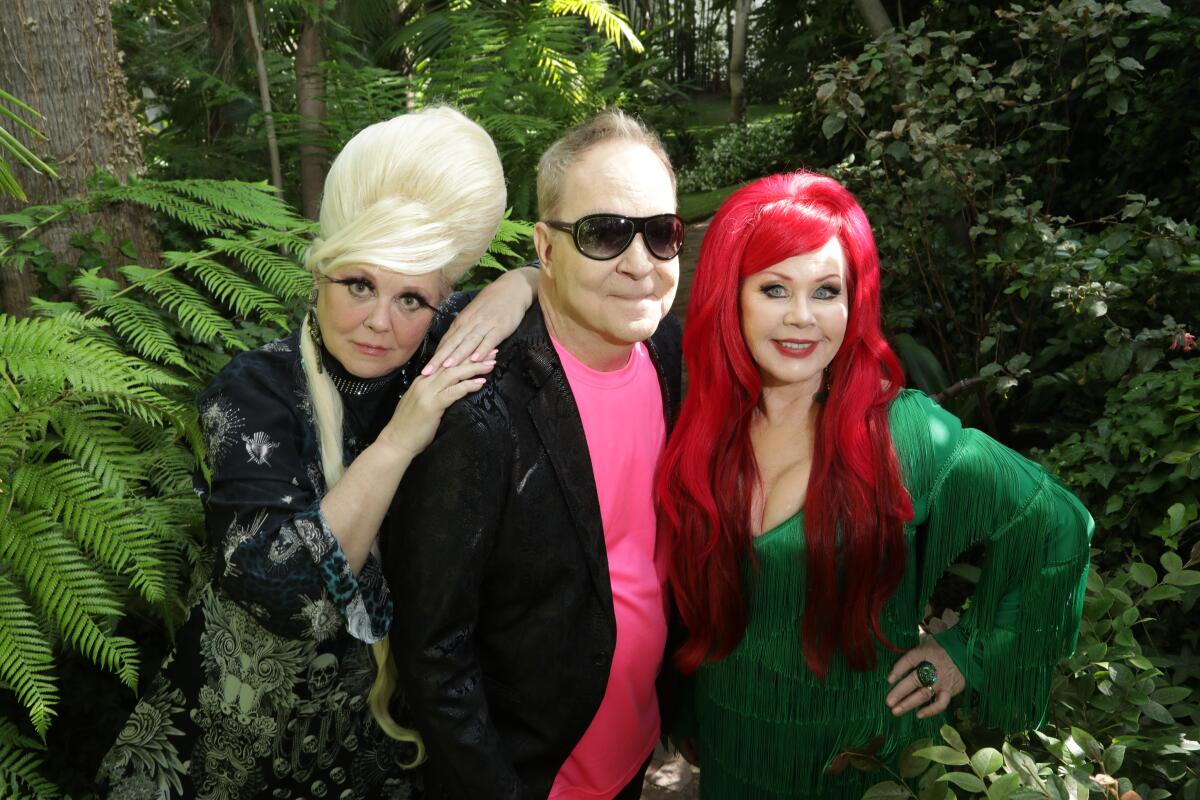
- Share via
Forty-three years after the release of their weird, wonderful debut album, the B-52’s are calling it a wrap.
Well, sort of.
This weekend the pioneering new wave band from Athens, Ga., will bring what’s billed as its farewell tour to Southern California for concerts Friday at Inglewood’s YouTube Theater and Saturday at the Honda Center in Anaheim. The show is meant to recap one of the most peculiar careers in pop history: a decades-long journey from underground cult-fave status as part of the arty Athens scene that also produced R.E.M. through Top 40 ubiquity with late-’80s hits like “Love Shack” and “Roam” to the members’ current position as elder statespeople of queer culture and alternative rock.
Jerry Lee Lewis’ marriage to his 13-year-old cousin in 1957 nearly ended his career. Today, Myra Williams, 78, reflects on the scandal and her late ex-husband.
“But this isn’t the last you’ve heard from the B-52’s,” promises singer Kate Pierson, 74, who’s on the road with fellow vocalists Fred Schneider, 71, and Cindy Wilson, 65. (Ricky Wilson, the band’s founding guitarist, died in 1985 of complications from AIDS; Keith Strickland, who played drums before replacing Ricky Wilson on guitar, stopped touring in 2012.) According to Pierson, the group still plans to play gigs now and then, and its music — an instantly identifiable blend of surf guitar lines, mutant funk beats, girl-group harmonies and Schneider’s wacky declamations — will soon be the subject of a documentary executive produced by comedian Fred Armisen. There’s also a book on the horizon and “like a Broadway thing, maybe,” Pierson said — indications of the band’s enduring influence on acts like Björk, Foo Fighters and the Yeah Yeah Yeahs.
Pierson and Schneider called from San Francisco, where the night before the two ended their show with a tug of war over Schneider’s wig. “My ring got stuck in it, so we had to walk offstage together,” Pierson recalled with a laugh.
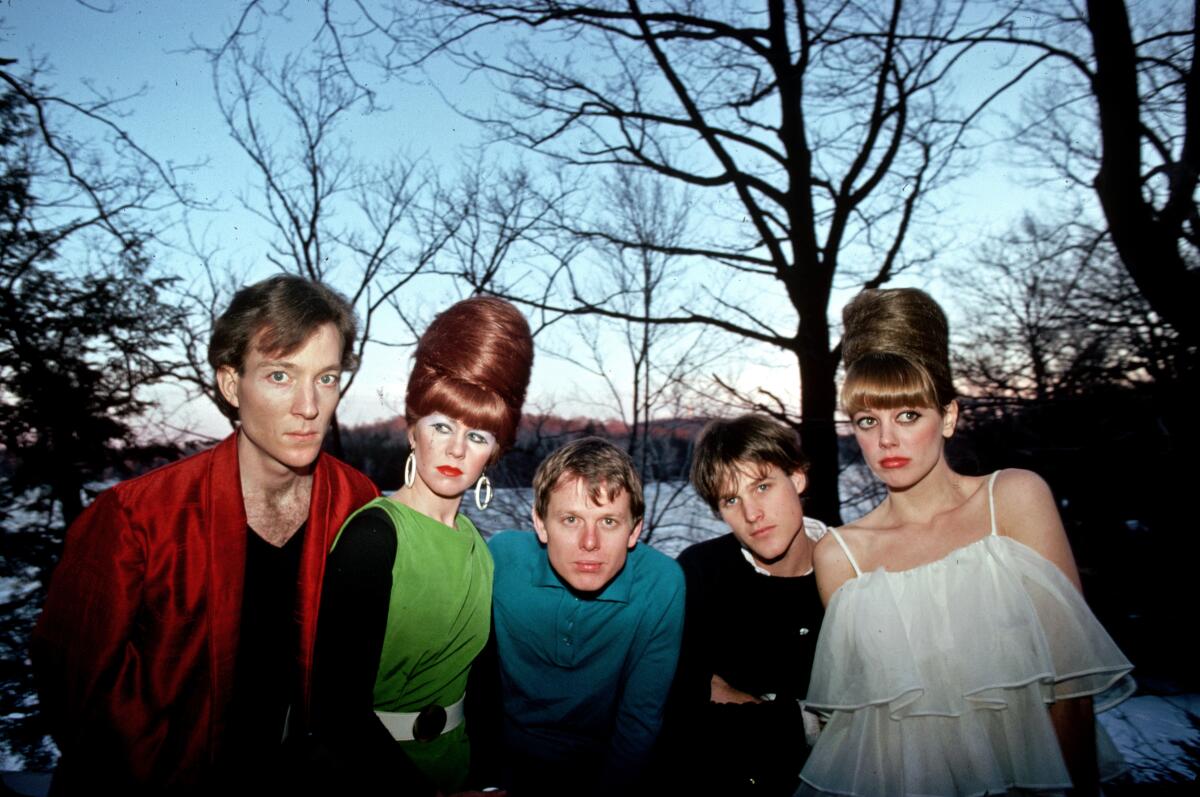
If someone were to describe the B-52’s as an oldies act, would that rankle you?
Fred Schneider: OK, I’m hanging up.
Kate Pierson: We’re so unusual, that somehow we’re not dated.
Schneider: We are old. But do you see anyone doing anything as dynamic as “Rock Lobster”? We’re completely hardcore.
Why quit touring then?
Schneider: It’s the travel.
It’s more uncomfortable now than when you were younger?
Schneider: Well, it was bad back then too. You couldn’t sleep on the bus and you had to take sleeping pills, and that really didn’t help the next day when you had to shake your tired little ass.
Pierson: I think Fred was the first one to say, “This is it — I’m tired of touring.” But of course we’ve stopped before, and then he’s the first to text me: “When are we having a show?”
Some acts, when they get tired of touring, they set up in Las Vegas, where the audience comes to you.
Pierson: I don’t know if I can say this yet, but we might have something in the works. Not, like, fully living in Vegas. But a stint there could be great.
The idea of living full-time in Vegas—
Pierson: Terrifies me. Walking around in Las Vegas is like the rings of hell descending into Dante’s inferno. It’s not a place to live.
The first two B-52’s albums — the self-titled debut from 1979 and “Wild Planet” from 1980 — are widely acknowledged new wave classics. Which do you like better?
Pierson: They’re really the same in the sense that we’d already written a lot of the songs on “Wild Planet” when we did the first album. They’re like one body of work, so I can’t really distinguish between them. But I guess the first one? When we recorded it in the Bahamas with Chris Blackwell producing, all he did was put his feet up on the console, light up a spliff and say, “I want you to play exactly like you play onstage.”
Schneider: When we first heard it, I was like, “Oh my God, are we this rinky-dink?” That’s why I asked that they put “Play loud” somewhere on the record — because I figured the louder you played it, the better it sounded.
Pierson: If [Blackwell] had pumped us up with a lot of production, I don’t think we would have stood out as this unique, raw band that we were. It had a sparse electricity that made us different. He kind of made a genius choice by keeping us this funky little party band from Athens, Georgia.

Both of you separately left New Jersey, where you grew up, to move to Athens. Why?
Schneider: I left because I wanted to get away from family things and the cliques in high school and all that stuff. I heard that when the first album came out, people from high school — the people I didn’t hang out with — were like, “Can you believe that’s Fred Schneider?”
Because you were more strait-laced back at home?
Schneider: No, I was sort of an oddball in high school. I used to make these scripted tapes. One of them was “Miss Supermarket Sweetheart,” and I had my best friend Jolene’s mother on it. Her mother, when she was a kid, was in a carnival as a Betty Boop impersonator. I always liked to be funny. But I wasn’t a happy child.
Pierson: The hand of fate brought me to Athens. I didn’t know anything about it, but I went traveling around Europe after college — this was after Kent State, and I was just through with the USA — and met my future ex-husband, Brian Cokayne. When we came back, a friend of mine who lived in Athens was driving down there, and we wanted to do a back-to-the-land thing, so we got a ride. We rented a little love shack for $15 a month — it really was set way back in the middle of a field. My whole introduction to Athens was country people. I didn’t even hardly go into town.
Schneider: I went to the University of Georgia on a scholarship in 1969. I was in forestry. I wanted to be a conservationist — you know, save animals and plants and wildlife. I didn’t realize forestry meant “How many deer can land support?” I lived in the agriculture dorm, which was across from the chicken farms, and it had no air conditioning. It stank. But I hung out with some guys who were more like hippies — well, I’d say freaks, they weren’t hippies.
Were you out at this point?
Schneider: No. I actually went to psychologists, because you didn’t really admit to anything like that. Back in the late ’60s, there was something wrong with you if you were gay. So I went, and the psychologist said, “There’s nothing wrong with that.” But people still gay-bashed, especially in Georgia, up until the ’80s. You didn’t have protection unless you were a big, big rock star, and we weren’t.
Kate, you married your wife in 2015. Did you feel free to express your sexual identity when you arrived in Athens?
Pierson: Well, my sexual identity was that I was with a guy. I didn’t really have to think about that. But the group that we were in in Athens was very fluid — lots of lesbians and lots of gay men. You didn’t have to identify yourself, so I never felt any need to be categorized.
Harry Styles’ young LGBTQ and nonbinary fans find special meaning and comfort in the pop star’s willingness to defy stereotypes on a grand scale.
Spin called “Love Shack” an “anthem of resistance” and said the song existed “within a larger framework of global warming and Republican rule.” Did you think of “Love Shack” as a political statement?
Pierson: I think it was a resistance to the AIDS epidemic. The whole idea of “Stay away, fools / ’Cause love rules” — that’s a resistance to all the negativity and sadness and angst that came out of AIDS, because so many of our friends died. It was a very dark time. In a sense, the “Cosmic Thing” album was a healing process after the death of Ricky, which we thought would be the end of the band. Keith and I moved to Woodstock, and Keith started writing music. I’d ride my canoe over to his house — we both lived on this pond — and he’d play me some music, and we just said, “We don’t care if this gets played on the radio — we’re just doing this to heal.”

Was it bittersweet to have the band reach its greatest commercial heights only after Ricky’s passing?
Pierson: It’s still hard to think that he’s not here. But we had a feeling that he would’ve been proud. He was almost part of it. His guitar style, which Keith continued and of course made his own — that was really such a signature part of those songs.
Would Ricky have enjoyed the level of pop stardom you achieved with that album?
Pierson: In a way, I think he would’ve fled and gone on his boat around the world. Ricky was very complicated — very shy and inward. I don’t know how he would’ve handled that.
Schneider: It was a surprise to all of us because we’d never been a band that would go, “OK, here’s the structure, here’s the words — let’s figure out how to make this a Top 10 hit.”
Did you ever worry that having a big radio song would chip away at your countercultural cool?
Pierson: No. People say they don’t want to have a hit, but they do. It’s acknowledgment that your music is being heard.
Schneider: We got to No. 3 [on the Hot 100] with “Love Shack,” but we were up against Milli Vanilli and Paula Abdul, who were both accused of not singing. We never got to No. 1.
You ever go to a friend’s wedding where the band happened to play “Love Shack” without knowing you were there?
Schneider: Oh, they’d know I’m there. I’ve actually crashed a wedding where the band played it. God, that’s awful. I don’t do karaoke anymore because people will film you, and I don’t want a video of me out there. If I do karaoke, I want to do a song and just ruin it. I’ll change the lyrics.
Like?
Schneider: I do “You Light Up My Pipe.”
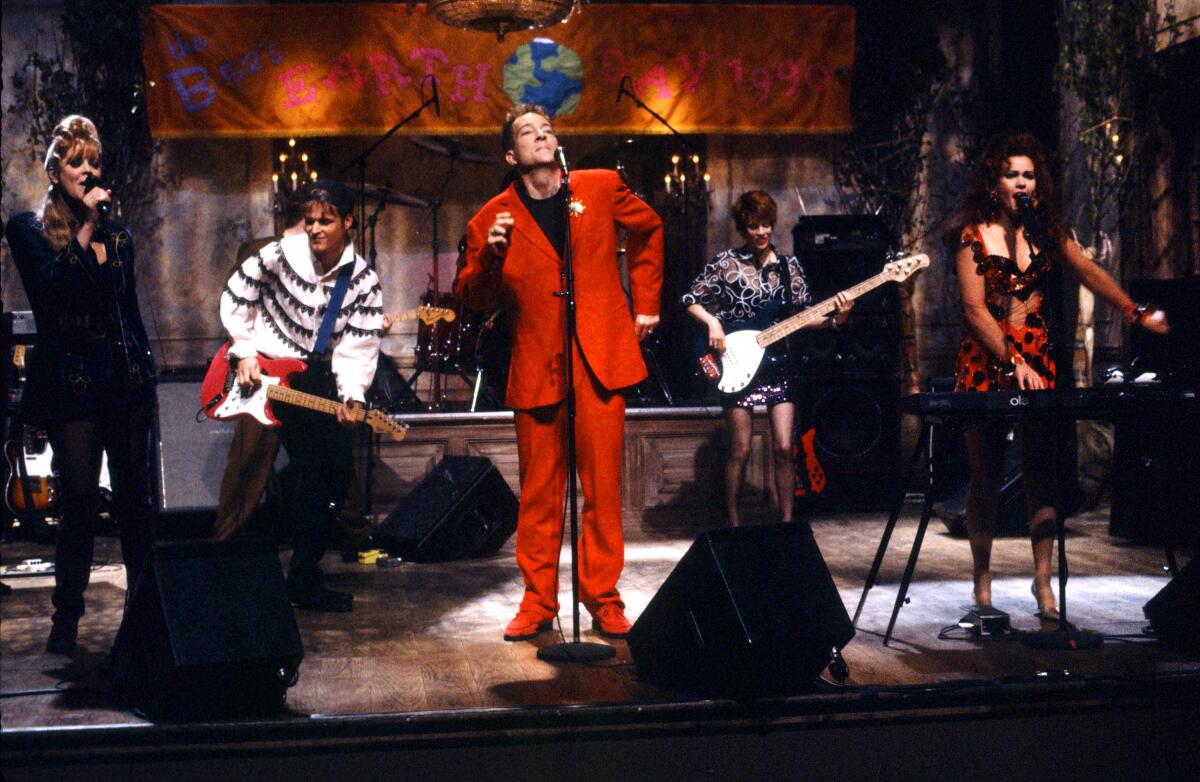
Who did you hear as a kid that made you think you could be a singer?
Schneider: Nobody. I sang in the shower, but that’s about it. Never sang in high school choir or anything like that. I was in musicals, but I would just sort of mouth the words so it looked like I was singing. My voice doesn’t blend in with a lot of others. And it was very weak at first, but I took voice lessons. I feel like I’m a much stronger singer now. But in the beginning I was more of a poet.
Did you listen to any of the stuff that inspired so many young white guys to become rock singers? Led Zeppelin? Aerosmith?
Schneider: I was a Motown nut — Martha and the Vandellas are my favorite of all time. I still like folk and soul more than rock ‘n’ roll. But I loved Led Zeppelin. When Kate and I inducted the Vandellas into the Rock and Roll Hall of Fame [in 1995], Robert Plant came up to me and said, “Oh yeah, I bought your first single.” My jaw fell to the floor.
John Lennon famously loved “Rock Lobster” too. Ever meet him?
Schneider: I met Paul [McCartney] — we did some PETA things together. He’s wonderful. Met Ringo [Starr] too. He was like, “Ugh, I can’t believe I have to do this.” But never met John. But I liked his books — “A Spaniard in the Works” and the other one. He was very inspiring to me because through him I became a huge fan of Edward Lear and absurdist stuff like that. Big fan of Yoko’s too — bought all of her albums.
As the band’s frontman, did you think of yourself in the early days as a sex symbol?
Schneider: No.
Why not?
Schneider: In the beginning I wore wife-beaters and seersucker pants and a pencil-thin mustache.
It was a vibe!
Schneider: Well, thank you. I thought it was cute. I look back and think I was skinny as hell. Now I’m like, “S—, I don’t look like that anymore.”
The band’s “Saturday Night Live” performance in 1980 is still viewed as one of the best of all time. What do you remember about it?
Pierson: I remember that we were scared and Ricky saying something like, “Don’t smile — it wouldn’t look cool to smile.” We were so stiff, and because of that we looked kind of like robotic aliens. There was all this speculation about where we were from: “Athens? Where’s that?” It’s like it was Mars or something. But it was just the beginning of when bands were sort of popping out of all these different places — Akron and wherever else. I remember we all fell down on “Rock Lobster,” which had an effect on people. It made them feel like, OK, I can be weird too.
Queer visibility is improving in pop music even as a lot of bleak stuff is happening politically in terms of LGBTQ rights.
Schneider: Like with Ron DeSatan — I mean, DeSantis?
I wonder if you feel hopeful or not about where things seem to be headed.
Pierson: It’s a horrible climate. It feels just like when I was in college, protesting the Vietnam War and feeling like the country’s going to hell. I mean, the abortion thing — I just can’t believe it. It’s hard to soak in what’s happening. But because we’re a queer band — I think it’s a statement. It makes a dent. Most of our shows, we say at the end, “Don’t forget to vote in the midterm elections.”
How does the audience react?
Pierson: It creates this kind of hush. The atmosphere now is so tense and divided. I put something on Facebook a while back about Hillary Clinton’s pantsuit and it sparked so much negativity.
Did that affect how you think about your fans?
Pierson: I think “Love Shack” says it all: All are welcome, and it really doesn’t matter what your politics are. Music transcends that. But if you’re coming to see the B-52’s, you get what you get.
More to Read
The biggest entertainment stories
Get our big stories about Hollywood, film, television, music, arts, culture and more right in your inbox as soon as they publish.
You may occasionally receive promotional content from the Los Angeles Times.
